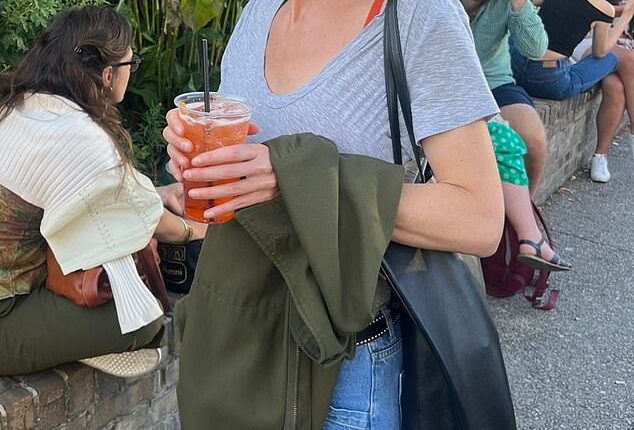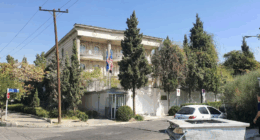I’m Monique and I’m 37.
It shouldn’t be something I need to ‘confess’ – and I know, intellectually, there’s nothing to be ashamed of – but my age is a detail that I’ve tried to conceal at work.
How successful I’ve been with this is unclear – I’d have to ask my colleagues – but, working on the very youthful Femail desk, I suppose I’ve lied by omission.
When the subject of birthdays comes up in our corner of the office, I place headphones over my ears, fix my eyes on the computer screen and type furiously.
If age is discussed at after work drinks in the pub, I adopt a vague expression and float away.
My issues with getting older cannot be blamed on my parents. Long before he got ill, my late dad would remind me, with typical dry humour, that getting older was ‘better than the alternative’.
But, every January when my birthday comes around, it’s tinged with a fear that is quite distinct from the existential dread that I assume everyone experiences.
I fear the physical signs of ageing which women, in particular, have long been told will limit not only their romantic opportunities but also their professional ones.

FEMAIL reporter Monique (pictured in 2024), 37, decided to find out her biological age with a GlcanAge test
For, though I think I would be able to blend in with my 28-year-old sister-in-law’s friends on a good day – I am, after all, committed to a complicated and expensive skincare routine – I know, rationally, that it’s almost impossible.
My fraught relationship with ageing is, at least in part, rooted in my understanding of how I’ve mistreated my body over the years, whether through the restrictive diets and over exercising that pervaded my teens and twenties, the smoking habit that continued for almost two decades – I stopped for good last Christmas – or the predilection for parties that has only recently given way to early nights.
While I would describe my present lifestyle as ‘moderate’ – I eat relatively well, keeping my passion for fried chicken in check, run or swim a couple of times a week, walk whenever I can and rarely drink more than two glasses of wine in one go – I have always wondered whether my previous behaviours would catch up with me.
Now in my late thirties – and aware that at 40 our risk of developing myriad health issues increases – I’m becoming more focused on looking after my body.
Already at an increased risk of certain cancers due to the BRCA2 gene, it would be foolish not to try to optimise my health and minimise the lifestyle factors that make us all more susceptible to disease.
And, just as someone who wants to improve their physical strength needs to start by understanding where their weaknesses are, I wanted to understand what kind of damage I was dealing with – which is where biological age testing came in.
‘Understanding a patient’s biological age can help identify potential areas for targeted interventions and assist in developing personalised treatment plans to optimise health and well-being,’ the company that conducted my test says in its patient report.
I must also add, however, that biological age testing is having a moment now, not least thanks to the success of comedian Katherine Ryan’s podcast ‘What’s My Age Again?’, which asks celebrity guests to take the test before being interviewed.

Today, Monique lives a ‘moderate’ lifestyle, eating relatively well and exercising a couple of times a week
The Mail’s Bryony Gordon appeared on the show last month, receiving a result that she was definitely not expecting.
Unsurprisingly, given what I’ve described here, I wasn’t particularly optimistic – I was sure my biological age would be significantly higher than my chronological age, probably somewhere between 50 and 70 – but it was still worth finding out.
Of the three tests that can determine someone’s biological age in 2025, I took the £375 GlcanAge test at the longevity-focused – and suitably futuristic – HUM2N clinic in London’s South Kensington.
As the clinic’s founder and CEO, Dr Mohammed Enayat, explained: ‘The test looks at a process called glycation, which is affected by inflammation, but particularly metabolic inflammation, as one of the major drivers of aging.’
The number and type of ‘glycans’ in the patient’s blood, chain-like structures which play a vital role in the majority of biological processes and determine whether your cells will experience inflammatory or anti-inflammatory reactions, are analysed in a lab.
Through this, it is possible to provide a clear picture of the general health of their body.
When I received my result in a typed report, I was nothing short of shocked. My biological age wasn’t somewhere between 50 and 70 – it was, remarkably, 20.
My first thought was: How? But while I had lots of questions for Dr Enayat, he was not especially surprised, partly due to the way the GlycanAge test actually works.

She runs and swims a couple of times a week and walks whenever she can
The test ‘reflects the preceding two-three months’, the doctor explained, which, in turn, means that the result can change – both improve and get worse – relatively quickly.
‘If you were to measure this during [a period of] illness, your biological age undoubtedly would have been a lot higher,’ he added.
I did my test on May 8 and, between March 1 and mid-April, I didn’t drink any alcohol, an irritating reminder that abstaining from booze only helps with overall health.
Dr Enayat agreed that my result was ‘obviously positive’ – but he didn’t let me bask in glory for too long.
Rather, we swiftly moved on to the areas where I didn’t score well and, in some cases, scored badly.
My score in one of the metrics, Glycan Median, which is positively influenced by factors like heart health, metabolic health and weight, was in the second percentile.
Improving this is relatively straightforward, however, with increased exercise – not only cardio but also strength training – being highly recommended.
Similarly, my score for the Glycan Lifestyle (B) metric, which is negatively influenced by factors like smoking, poor sleep and stress, was much worse than that of other women my age.

Dr Mohammed Enayat (pictured) is the founder and CEO of the longevity-focused HUM2N clinic in London’s South Kensingon
I’m painfully aware that I don’t sleep very well, often waking in the very early hours and unable to get back to sleep, something which I reported in the symptom questionnaire that I filled out before discussing my results with the doctor.
There are, of course, measures I can take here, the most obvious being paying more attention to the horribly-named ‘sleep hygiene’.
The 3-2-1 rule, for example, which insists on no food or alcohol three hours before bed, no work or exercise two hours before bed and no screens one hour before bed, is one tried and tested approach.
As someone who tends to scroll news, clothes and dating apps until my eyes are closing, or my phone runs out of battery, there’s a lot of room for improvement.
So, what now? The worst thing I could do with my impressive result, I was made to understand, would be to be complacent.
Given that biological age can change as frequently as every two-three months, it would be unadvisable to embrace late nights or start drinking to excess.
While it might be interesting to see how much damage I could do in a relatively short period, a much better bet would be to remember where I didn’t score well and work with experts – a nutritionist and personal trainer in my case – to improve these.

The HUM2N clinic (pictured) is very futuristic, with lots of steel and neon lighting

Dr Enayat (pictured at the HUM2N clinic) is particularly interested in self-regenerative medicine
Indeed, members of HUM2N’s health programmes experience a 42 per cent improvement in their overall health in as little as eight weeks.
With memberships starting at £299 per month, plus a joining fee of £595, an advanced clinic like HUM2N could not be called accessible – though I’ve no doubt that I would experience the improvements promised.
But am I ready to commit to a rigorous programme when the sun is shining, outdoor drinking is in full swing and holidays are on the horizon? I think I better leave it until September.








